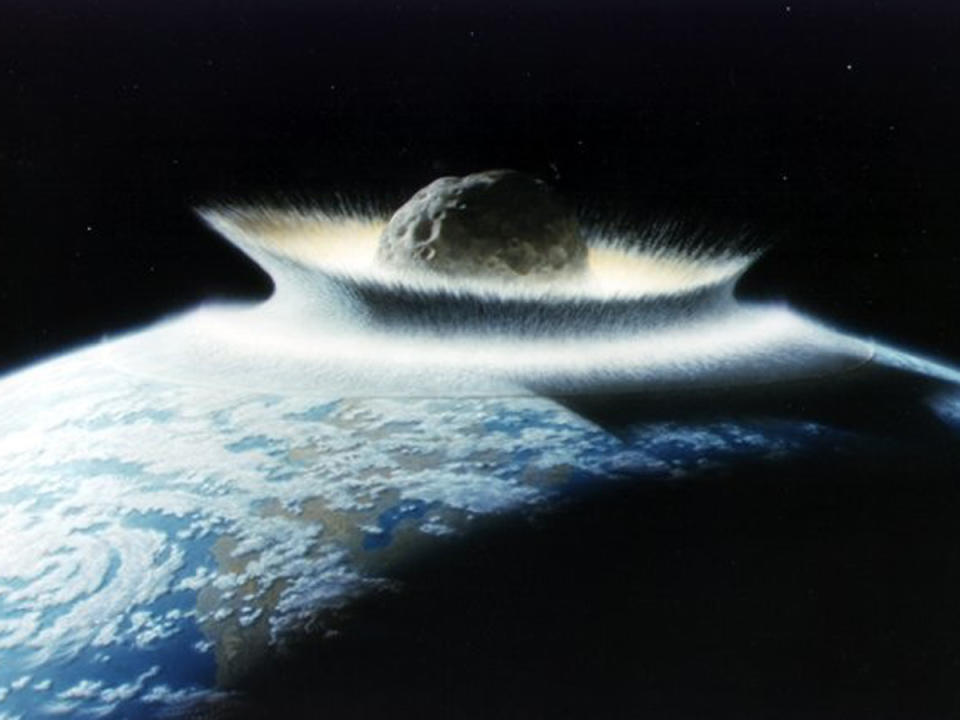'65' star Adam Driver asks NASA about the asteroid threat to Earth (video)

- Oops!Something went wrong.Please try again later.
The extinction of the dinosaurs more than 65 million years ago is a striking example of the devastation that an asteroid can wreak when it slams into Earth.
A newly released movie from Sony Pictures, fittingly titled "65," plays on the epic disaster. It tells the tale of an astronaut propelled back to the late Cretaceous period, just before a roughly 6-mile-wide (10 kilometers) asteroid hit Earth off the coast of Mexico, wiping out the dinosaurs along with three-quarters of the planet's plant and animal species. Adam Driver plays the hapless time-traveling astronaut, who's literally caught between a rock and a hard place (and some dinosaurs).
In a new video posted to NASA's YouTube channel, Driver asks agency experts some questions about asteroids and the danger they pose to Earth — and to humanity.
Related: What we know about the dinosaur-killing asteroid

Speaking to astronomer Kelly Fast, manager of NASA's Near-Earth Object (NEO) Observations Program, Driver first asks what would happen if we were to discover an asteroid like the dino-killing space rock speeding toward Earth today.
"The good thing is that we're really not that concerned about asteroids of that size," Fast answered. "Those large ones — most of them have been found. They're easier to spot. There are fewer of them."
The NASA astronomer explained that there are, however, undiscovered near-Earth asteroids that are still big enough to do considerable damage should they strike Earth.
"If an asteroid were discovered that was going to impact Earth," Fast said, "NASA's role would be to inform planning, to give information about the asteroid, about where the impact would happen, about what the effects might be, so that everyone would have the most up-to-date, accurate and expert information available."
Driver's next question concerned NASA's Double Asteroid Redirection Test (DART), which intentionally crashed a spacecraft into Dimorphos, the smaller member in the two-asteroid Didymos system. DART hit Dimorphos on Sept. 26, 2022, to see if its orbit could be altered.
DART succeeded, shortening the orbit of Dimorphos around Didymos by 33 minutes. But Driver wanted to know if something similar to the proof-of-concept test could be used to divert an asteroid off a collision course with Earth.
"DART showed that we do have the technology for diverting an asteroid in space, but there is still a lot left to be done," Fast explained. "Options for deflecting an asteroid or doing anything about an asteroid really depend on the asteroid — on its size, on its composition."
Fast pointed out that deflecting an asteroid would also depend on the amount of time before the impact. As longer lead times mean the asteroid's orbit may only have to be shifted slightly in order to miss our planet, Fast emphasized the importance of early detection.
The Hollywood star's third and final question to Fast involved NASA's first asteroid sample return mission, OSIRIS-REx. The mission is set to return a sample from the carbonaceous near-Earth asteroid Bennu to Earth on Sept. 24, 2023. Driver wanted to know what NASA hopes to learn from the Bennu sample.
Related stories:
— How humanity could deflect a giant killer asteroid
— How big is the asteroid threat, really?
— Potentially dangerous asteroids (images)
"Scientists are very interested in studying Bennu, because it is largely unchanged since the formation of the solar system," Fast said. The astronomer was referring to the fact that asteroids are believed to have formed when the planets of the solar system did, around 4.5 billion years ago, and from the same material that birthed those planets, including Earth.
"So scientists plan to study that sample to learn about the early solar system, to learn about the origins of organics and water, which are important for studying life on Earth," Fast concluded.
Driver signed off by thanking Fast and her colleagues at NASA for their efforts in protecting the planet from the threat of asteroids, possibly channeling his character in "65," who may just wish such experts had been around tens of million years ago, too.
Written and directed by Scott Beck and Bryan Woods and also starring Ariana Greenblatt, "65" opened in cinemas across the United States on March 10.
Follow us on Twitter @Spacedotcom or Facebook.

